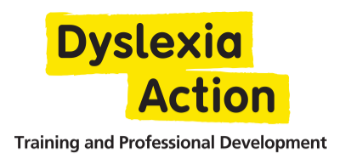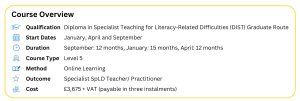

 Site Navigation
Site Navigation

 The Level 5 Diploma in Specialist Teaching for Literacy-Related Difficulties (DIST) is a unique, online SpLD training qualification ‘fast track’ route that trains teachers, teaching assistants and support tutors who hold a degree, to become qualified specialist SpLD teachers (if you hold QTS/PGCE) or SpLD practitioners (for those without QTS/PGCE). The programme is comprehensive, flexible and undertaken part-time.
The Level 5 Diploma in Specialist Teaching for Literacy-Related Difficulties (DIST) is a unique, online SpLD training qualification ‘fast track’ route that trains teachers, teaching assistants and support tutors who hold a degree, to become qualified specialist SpLD teachers (if you hold QTS/PGCE) or SpLD practitioners (for those without QTS/PGCE). The programme is comprehensive, flexible and undertaken part-time.

DIST Part 1: Understanding Literacy Difficulties
DIST Part 2: Foundations for Building Structured Literacy Teaching Interventions
DIST Part 3: Extending Specialist Literacy Teaching Skills
The Dyslexia Action Diploma in Literacy-Related Difficulties is most appropriate for a wide range of professional teachers and specialists who have a relevant classroom or student learning support experience including:
Qualifications
Prospective students will have:
Please note: We reserve the right to reject any application that does not meet the criteria specified.
If you require masters university credits and can commit to 15 notional hours per week (rising to 20 hours during the teaching practicum and at points in other modules when key formative and summative tasks are being undertaken) you may want to consider joining our Level 7 Postgraduate Certificate: Specialist Teaching for Literacy-Related Difficulties course. If you do not hold a degree you may be interested in our alternative Level 5 Diploma in Specialist Teaching for Literacy-Related Difficulties (DIST) CPD Pathway route.
Are there any live tutorials?
There are no ‘live’ one-to-one tutorials or meeting provisions within the modules or requirements to be online at particular/set times of the day).
Supervised Teaching
The learner selected for the teaching intervention programme must be available for the duration of the teaching practice (around 14 school/college weeks). If the learner is going to be away for more than a week during the teaching practice, she/he may not be suitable for this intervention, similarly learners taking examinations may not have the time or focus to fully engagement. Tutors will advise on the suitability of chosen learners, based on the information provided, but it is the responsibility of participants to find and select suitable learners. Lessons must take place as face-to-face sessions; no on-line version of the teaching programme is currently offered.
See: MEd syllabus brochure above for further details.
Working with a learner
Participants are required to find learners whose main difficulties are with literacy and who are not currently receiving any other form of specialist teaching support.
See: MEd syllabus brochure above for further details.
Required Teaching Practice Hours
Dyslexia Action requires you to undertake a minimum of 20 hours of teaching support during the teaching practice. At least 10 hours of teaching support should be done with one learner individually (not in a group setting). The remaining hours can be carried out with either the same learner or another learner (or a small group of learners). Lessons normally take place on a weekly basis allowing lesson plans to be developed, resources to be prepared and tutor feedback given. Individual lessons can be scheduled for one hour or one-and-a-half hours with the learner (as appropriate for the age and profile of the learner).
Teaching practice and assessment administration
Participants working with children can only teach a learner within a DfE registered state or independent school with a Unique Reference Number (URN). See: get-information-schools.service.gov.uk/Search for details of how to find details of schools and schools’ URNs (this does not apply to those based overseas, although the school or college should be a registered organisation through the state authority).
It is not permitted for participants to undertake teaching practice or assessment administration in their own home or the learner’s family home.
Will I need a DBS?
As a Disclosure and Barring Service Enhanced Disclosure is a requirement for working with children and young people, the person you choose to use for any practical teaching should be someone within your school or workplace, where you will already have a DBS Enhanced Disclosure. We reserve the right to request your DBS information from you. For further information please visit this dedicated page here.
Further details can be found in the MEd syllabus brochure above.
The assessment strategy for this programme covers both theoretical and practical elements and is designed to develop practical skills in specialist teaching and assessment and encourage evaluation of the research and evidence-based, so that theory is integrated into practice. A combination of assessment tools is used and these include:
After completion of the Level 5 Diploma in Specialist Teaching for Literacy-Related Difficulties (DIST) you can move on to study assessment modules which will enable you to become a fully qualified Assessor and give you eligibility to apply for an Assessment Practising Certificate.
Start dates: September, January and April
Duration: One year, 13 notional hours of study per week
There are no additional costs for international delegates.
7 April 2026 Cohort
Applications close 6 March 2026, or sooner if the course is full, places are limited.
Please note:
Next Steps (Decision)
A decision on the outcome of your application usually takes up to 10 working days.
1 September 2026 Cohort
Applications close 31 July 2026, or sooner if the course is full, places are limited.
Please note:
Next Steps (Decision)
A decision on the outcome of your application usually takes up to 10 working days.
Dyslexia Action courses have been in existence for 50 years and have a national respected profile in specialist teacher training and support. Our courses meet several accreditation criteria reflecting the importance we place on the quality of our courses and high standards of teaching and learning which are intrinsic to our programmes.
The Level 5 Diploma (DIST) confers eligibility for Associate Membership of The Dyslexia Guild (ADG) recognised as the first grade of professional membership for a specialist teacher/practitioner and approved by The CPD Standards Office (subject to accreditation)
The Level 5 Diploma (DIST) is approved by the British Dyslexia Association (subject to accreditation) for Approved Teacher Status or Approved Practitioner Status (ATS/APS) and PATOSS for Associate membership.